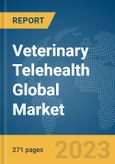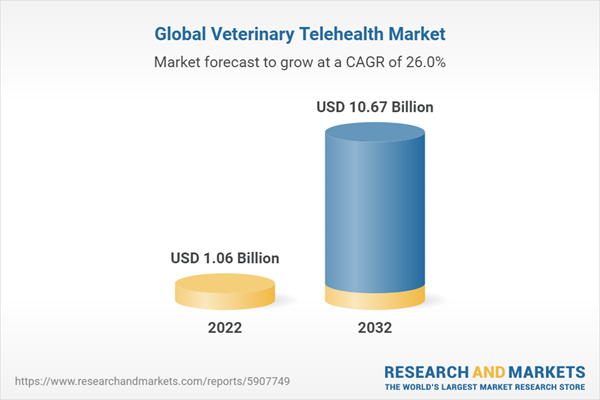The global veterinary telehealth market reached a value of nearly $1,061.3 million in 2022, having grown at a compound annual growth rate (CAGR) of 24.9% since 2017. The market is expected to grow from $1,061.3 million in 2022 to $3,365.4 million in 2027 at a rate of 26.0%. The market is then expected to grow at a CAGR of 26.0% from 2027 and reach $10,679.0 million in 2032.
Growth in the historic period resulted from strong emerging markets growth, increased spending on pets, supportive government initiatives, and increased penetration of pet insurance.
Going forward, the increasing pet ownership, the increasing consumption of animal-derived products, and the increasing urbanization will drive the market. Factors that could hinder the growth of the veterinary telehealth market in the future include the shortage of veterinarians.
The veterinary telehealth market is segmented by animal type into canine, feline, equine, bovine, swine, and other animal types. The other animal types market was the largest segment of the veterinary telehealth market segmented by animal type, accounting for 25.8% of the total in 2022. Going forward, the canine segment is expected to be the fastest growing segment in the veterinary telehealth market segmented by animal type, at a CAGR of 26.6% during 2022-2027.
The veterinary telehealth market is segmented by service type into telemedicine, teleconsulting, telemonitoring, and other service types. The teleconsulting market was the largest segment of the veterinary telehealth market segmented by service type, accounting for 33.4% of the total in 2022. Going forward, the telemedicine segment is expected to be the fastest growing segment in the veterinary telehealth market segmented by service type, at a CAGR of 27.1% during 2022-2027.
North America was the largest region in the veterinary telehealth market, accounting for 45.3% of the total in 2022. It was followed by Asia Pacific, and then the other regions. Going forward, the fastest-growing regions in the veterinary telehealth market will be Asia Pacific and the Middle East where growth will be at CAGRs of 29.5% and 28.2% respectively. These will be followed by Africa and Western Europe where the markets are expected to grow at CAGRs of 26.7% and 25.3% respectively.
The veterinary telehealth market is fragmented, with a large number of small players in the market. The top ten competitors in the market made up to 5.84% of the total market in 2022. FirstVet was the largest competitor with 0.95% share of the market, followed by Whiskers Worldwide, LLC with 0.75%, Airvet with 0.74%, BondVet with 0.72%, Fuzzy Pet Health with 0.57%, Petzam with 0.48%, PetDesk with 0.48%, WellHaven Pet Health with 0.44%, VetCT with 0.37%, and TeleVet with 0.35%.
The top opportunities in the veterinary telehealth market segmented by animal type will arise in the other animal types segment, which will gain $609.5 million of global annual sales by 2027. The top opportunities in the veterinary telehealth market segmented by service type will arise in the teleconsulting segment, which will gain $776.8 million of global annual sales by 2027. The veterinary telehealth market size will gain the most in the USA at $896.3 million.
Market-trend-based strategies for the veterinary telehealth market include focus on advanced technologies such as artificial intelligence, new facility expansions, partnerships and collaborations, and launch of new veterinary telehealth services to improve their financial strength and product portfolio.
Player-adopted strategies in the veterinary telehealth market include enhancing business operations through the launch of new services and strengthening operational capabilities through business expansions.
To take advantage of the opportunities, the recommends the veterinary telehealth companies to focus on use of artificial intelligence, focus on new facility expansions, focus on new service launches, expand in emerging markets, continue to focus on developed markets, focus on strategic partnerships and collaborations, provide competitively priced offerings, participate in trade shows and events and focus on urban population.
Table of Contents
Executive Summary
Veterinary Telehealth Global Market Opportunities And Strategies To 2032 provides the strategists; marketers and senior management with the critical information they need to assess the global veterinary telehealth market as it emerges from the COVID-19 shut down.Reasons to Purchase
- Gain a truly global perspective with the most comprehensive report available on this market covering 12 geographies.
- Understand how the market is being affected by the coronavirus and how it is likely to emerge and grow as the impact of the virus abates.
- Create regional and country strategies on the basis of local data and analysis.
- Identify growth segments for investment.
- Outperform competitors using forecast data and the drivers and trends shaping the market.
- Understand customers based on the latest market research findings.
- Benchmark performance against key competitors.
- Utilize the relationships between key data sets for superior strategizing.
- Suitable for supporting your internal and external presentations with reliable high-quality data and analysis
Description:
Where is the largest and fastest-growing market for veterinary telehealth? How does the market relate to the overall economy; demography and other similar markets? What forces will shape the market going forward? This report answers all these questions and many more.The report covers market characteristics; size and growth; segmentation; regional and country breakdowns; competitive landscape; market shares; trends and strategies for this market. It traces the market’s history and forecasts market growth by geography. It places the market within the context of the wider veterinary telehealth market; and compares it with other markets.
The report covers the following chapters
- Introduction and Market Characteristics: Brief introduction to the segmentations covered in the market, definitions and explanations about the veterinary telehealth market.
- Key Trends: Highlights the major trends shaping the global veterinary telehealth market. This section also highlights likely future developments in the market.
- Global Market Size and Growth: Global historic (2017-2022) and forecast (2022-2027, 2032F) market values, and drivers and restraints that support and control the growth of the market in the historic and forecast periods.
- Regional Analysis: Historic (2017-2022) and forecast (2022-2027, 2032F) market values and growth and market share comparison by region.
- Market Segmentation: Contains the market values (2017-2022) (2022-2027, 2032) and analysis for each segment by animal type and by service type in the market.
- Regional Market Size and Growth: Regional market size (2022), historic (2017-2022) and forecast (2022-2027, 2032F) market values, and growth and market share comparison of countries within the region. This report includes information on all the regions Asia-Pacific, Western Europe, Eastern Europe, North America, South America, Middle East and Africa and major countries within each region.
- Competitive Landscape: Details on the competitive landscape of the market, estimated market shares and company profiles of the leading players.
- Key Mergers and Acquisitions: Information on recent mergers and acquisitions in the market covered in the report. This section gives key financial details of mergers and acquisitions, which have shaped the market in recent years.
- Market Opportunities And Strategies: Describes market opportunities and strategies based on findings of the research, with information on growth opportunities across countries, segments and strategies to be followed in those markets.
- Conclusions And Recommendations: This section includes recommendations for veterinary telehealth providers in terms of product/service offerings geographic expansion, marketing strategies and target groups.
- Appendix: This section includes details on the NAICS codes covered, abbreviations and currencies codes used in this report.
Scope
Markets Covered:
- 1) By Animal Type: Canine; Feline; Equine; Bovine; Swine; Other Animal Types
- 2) By Service Type: Telemedicine; Teleconsulting; Telemonitoring; Other Service Types
Companies Mentioned:
FirstVet; Whiskers Worldwide, LLC; Airvet; BondVet and Fuzzy Pet Health.Countries:
China; Australia; India; Indonesia; Japan; South Korea; USA; Brazil; France; Germany; UK; RussiaRegions:
Asia-Pacific; Western Europe; Eastern Europe; North America; South America; Middle East; AfricaTime-series:
Five years historic and ten years forecast.Data:
Ratios of market size and growth to related markets; GDP proportions; expenditure per capita; veterinary telehealth indicators comparison.Data segmentations:
country and regional historic and forecast data; market share of competitors; market segments.Sourcing and Referencing:
Data and analysis throughout the report is sourced using end notes.Companies Mentioned
- FirstVet
- Whiskers Worldwide, LLC
- Airvet
- BondVet
- Fuzzy Pet Health
- Petzam
- PetDesk
- WellHaven Pet Health
- VetCT
- TeleVet
- Practo
- VetFamily
- Vettr
- The Vet Connection
- Homevet
- China Animal Healthcare Ltd
- Ceva Sant Animale
- Merck/MSD Animal Health
- Boehringer Ingelheim
- VetPlanet
- VetNOW
- Vetster
- Pawzy
- PocketPills for Pets
- TeleVet
- VIC Animal Health
- AVZ animal health
- Provet Group
- VitOMEK LCC
- Micro-plus
- Biowet
- Bioveta
- VELELEK
- Delos Medica
- Vetro Solutions
- Belfarmacom
- Pawp
- GuardianVets
- PetLove
- Doctor Vet
- Teleconsulta Veterinaria
- Vetwork
- Aster DM Healthcare
- Sesneber International
- GE Healthcare
- Medtronic Saudi Arabia
- Cisco Saudi Arabia Limited Company
- Altibbi
- Global Vet Ltd
- Multivet Ghana Ltd
Table Information
| Report Attribute | Details |
|---|---|
| No. of Pages | 271 |
| Published | November 2023 |
| Forecast Period | 2022 - 2032 |
| Estimated Market Value ( USD | $ 1.06 Billion |
| Forecasted Market Value ( USD | $ 10.67 Billion |
| Compound Annual Growth Rate | 26.0% |
| Regions Covered | Global |
| No. of Companies Mentioned | 50 |









